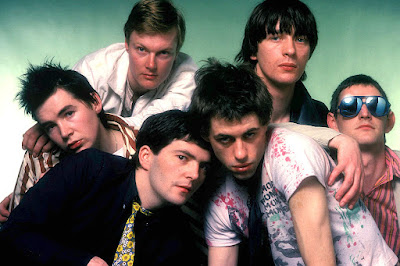 |
| Somewhere around their peak... |
This chapter covers one of my favorite bands through the second half of high school. When someone told me the ‘keeper on my high school soccer team loved them as much as I did, I tried to bond with him, but he wasn’t having it. I took it well, honest. Both own-goals were totally unintentional…
The Hit
“A reporter reached Spencer by phone while she was still in the house after the shooting, and asked her why she committed the crime. She reportedly answered: ‘I don't like Mondays. This livens up the day.’”
The “Spencer” in that quote refers Brenda Spencer, a troubled young woman who fired shots at the elementary school across the street from her house in January of ’79. A pair of Irish musicians named Bob Geldof and Garry Roberts caught wind of the story and decided to make a song out of it, and a statement. You can see Geldof very briefly explain in a 1981 appearance on Merv Griffin’s show (and do stick around for the banter at the end of it, because both men seem to get a kick out of needling each other). To wrap up Spencer’s story, it’s a sad one. She lived in squalor with a single dad who drank too much and what sound like some serious mental health issues. Suffice to say, her father wasn’t very supportive:
“Spencer later said, ‘I asked for a radio and he bought me a gun.’ Asked why he had done that, she answered, ‘I felt like he wanted me to kill myself.’”
The song was The Boomtown Rats' “I Don’t Like Mondays,” the only U.S. hit the band ever had. If you’ve ever heard Johnnie Fingers opening piano figures, you know it in an instant. It never occurred to me till that performance on Merv Griffin that the instrumentation doesn’t seem to go beyond what they had on stage: a piano, a swelling synth to fill in the sound and a timpani (or something similar) to give it a nice little boom. Still, it contains many touches of your average Rats song, most notably a knack for cutting to the bone of troubling subject-matter and the call-response in and around the chorus that…for lack of a better word, comes off like camp.
I never find a source that said how high “I Don’t Like Mondays” climbed up Billboard’s Hot 100 - though Wikipedia makes clear it stalled below the Top 10 - and I have no idea how long it stayed there. I do, however, remember coming back to that one sometime after hearing my first song by The Boomtown Rats, the radio edit of “Up All Night” that MTV played back in its early days (a lot, certainly the Geldof remembers). Suffice to say, I got the drift of The Boomtown Rats one big U.S. hit, even the lyrics aren’t entirely linear, far earlier than I figured out “Up All Night.” Sadly, “I Don’t Like Mondays” remains topical as the day he wrote it. From a 2020 interview with a site that was one called Hot Press:
The Hit
“A reporter reached Spencer by phone while she was still in the house after the shooting, and asked her why she committed the crime. She reportedly answered: ‘I don't like Mondays. This livens up the day.’”
The “Spencer” in that quote refers Brenda Spencer, a troubled young woman who fired shots at the elementary school across the street from her house in January of ’79. A pair of Irish musicians named Bob Geldof and Garry Roberts caught wind of the story and decided to make a song out of it, and a statement. You can see Geldof very briefly explain in a 1981 appearance on Merv Griffin’s show (and do stick around for the banter at the end of it, because both men seem to get a kick out of needling each other). To wrap up Spencer’s story, it’s a sad one. She lived in squalor with a single dad who drank too much and what sound like some serious mental health issues. Suffice to say, her father wasn’t very supportive:
“Spencer later said, ‘I asked for a radio and he bought me a gun.’ Asked why he had done that, she answered, ‘I felt like he wanted me to kill myself.’”
The song was The Boomtown Rats' “I Don’t Like Mondays,” the only U.S. hit the band ever had. If you’ve ever heard Johnnie Fingers opening piano figures, you know it in an instant. It never occurred to me till that performance on Merv Griffin that the instrumentation doesn’t seem to go beyond what they had on stage: a piano, a swelling synth to fill in the sound and a timpani (or something similar) to give it a nice little boom. Still, it contains many touches of your average Rats song, most notably a knack for cutting to the bone of troubling subject-matter and the call-response in and around the chorus that…for lack of a better word, comes off like camp.
I never find a source that said how high “I Don’t Like Mondays” climbed up Billboard’s Hot 100 - though Wikipedia makes clear it stalled below the Top 10 - and I have no idea how long it stayed there. I do, however, remember coming back to that one sometime after hearing my first song by The Boomtown Rats, the radio edit of “Up All Night” that MTV played back in its early days (a lot, certainly the Geldof remembers). Suffice to say, I got the drift of The Boomtown Rats one big U.S. hit, even the lyrics aren’t entirely linear, far earlier than I figured out “Up All Night.” Sadly, “I Don’t Like Mondays” remains topical as the day he wrote it. From a 2020 interview with a site that was one called Hot Press:


